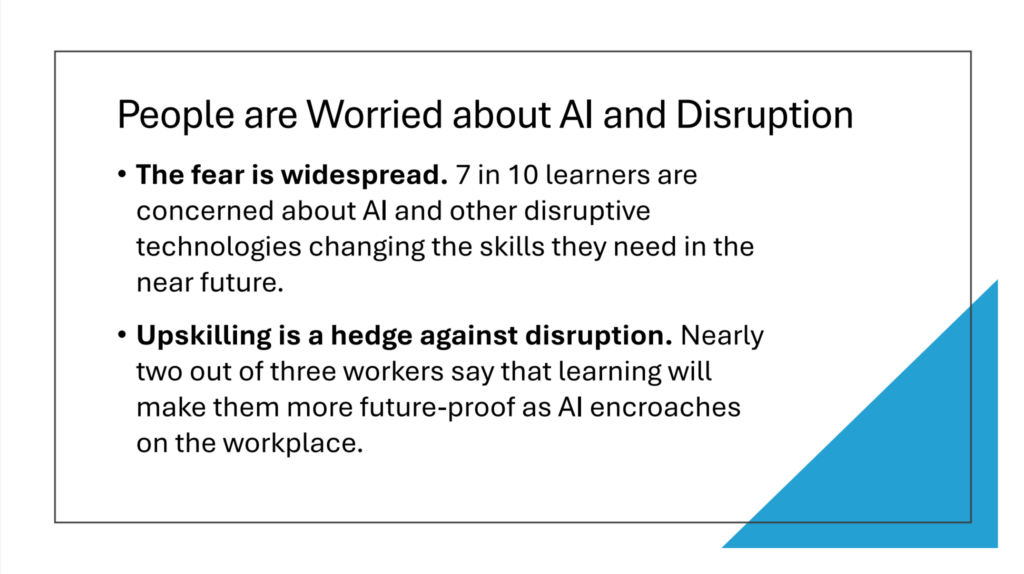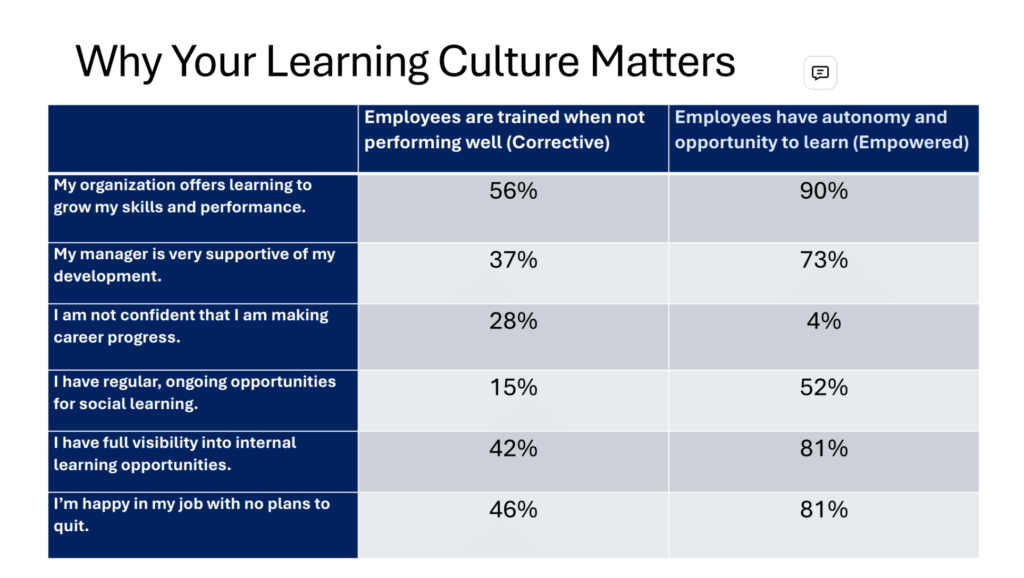In the current environment of rapid technological advancement, the expanding prevalence of sophisticated technologies and AI has ignited both apprehension and curiosity among professionals. The quickened pace at which disruptive innovations reshape industries has left many apprehensive about future employment landscapes and the requisite skillsets for professional viability. Our recent research on learning reveals that most professionals are concerned about how these advancements will transform work, underscoring the critical need for skills development to respond strategically to these transformative trends.
Navigating Uncertainty: The Crucial Role of Skills Enhancement
The unease surrounding technological disruptions, characterized by the rise of automation and intelligent systems, is grounded in real-world changes reshaping career trajectories and job requirements across sectors. This concern extends beyond the fear of potential job redundancy to the broader anxiety about the shift in skills and competencies that future roles will require. In response, a substantial proportion of the workforce is turning towards lifelong learning as an essential strategy to safeguard their careers from being rendered obsolete by technological encroachments. This approach reflects a broader resilience and adaptability fundamental to thriving in an era of digital transformation. Our research study, which partnered with the Adobe Learning Management team, found that 7 in 10 learners are concerned about AI and other disruptive technologies changing the skills they need soon. I believe that, more than ever, employers can impact employees’ mindsets by providing transparency in their direction and clarity on how they can embrace change together.
Lifelong Learning: Essential Strategy for Career Longevity
As we navigate the challenging dynamics of technological change, pursuing ongoing learning is a strategy and vital for professional sustainment and advancement. Committing to lifelong learning is a hopeful strategy, offering individuals a way to cope with the uncertainties of technological advancements. It enables professionals to remain current with tech trends, acquire new abilities, and adapt to changing job responsibilities. This proactive engagement in continuous education safeguards against the risks associated with technological displacement, ensuring relevance and competitiveness in a promising yet uncertain future.
Cultivating a Supportive Learning Environment
However, the endeavor to continually enhance one’s professional capabilities does not occur in isolation. It requires a conducive learning environment—a culture where professionals are encouraged and equipped to pursue knowledge and skill enhancement. Such a culture is critical in enabling successful learning outcomes, where individuals have the freedom and the resources to seek personal and professional growth. In these settings, organizational culture evolves to support a more supportive, nurturing atmosphere that fosters innovation and skill development.
The Role of Organizations in Supporting Professional Development
Organizations have a significant responsibility to promote a culture of learning. Forward-thinking companies recognize the value of integrating comprehensive learning and development opportunities into their employee value propositions. By investing in their employees’ growth, these organizations boost individual performance and enhance their collective ability to manage and excel amid ongoing technological changes. The above graph from our Learners Research tells a story on the importance of investing in employees and providing autonomy and opportunity. Employees working in a corrective culture establishment are 7x more likely to have less confidence about their career progress than those with a learning culture of empowerment.
Conclusion: The Interplay of Learning, Culture, and Professional Development
The interplay of learning, culture, and professional development underscores a crucial paradigm in the modern workplace, where continuous knowledge acquisition is integral to organizational agility and individual career resilience. Autonomy is pivotal in this scenario, empowering individuals to take charge of their professional evolution and fostering a learning culture that adapts and thrives amidst technological disruptions. Leadership equally assumes a vital responsibility in creating and sustaining an environment that values continuous learning as a cornerstone of professional development. Together, autonomy and leadership are indispensable in navigating the complexities of the current professional landscape, ensuring that both organizations and their employees are equipped to meet the demands and opportunities of the future. I believe uncertainty creates an opportunity for employees and employers to embrace the unknown with resilience and innovation, fostering a climate where challenges are met with creativity and courage. In this dynamic landscape, we can redefine the boundaries of what is possible, leveraging adversity as a catalyst for growth and transformation. By cultivating an environment that values adaptability, continuous learning, and collaborative problem-solving, we can turn uncertainty into a launching pad for groundbreaking achievements and sustainable success. Together, let us seize this moment to pioneer new frontiers, demonstrating that the potential for extraordinary progress and development lies in the heart of uncertainty.

George Rogers is the Chief Strategy Officer at Lighthouse Research & Advisory. He is an author, coach, and globally renowned keynote speaker acclaimed for delivering compelling insights on cultivating purpose-driven, profitable businesses. As a leader developing inclusive and motivating workplace environments, he consistently provides transformative perspectives and guidance to organizations worldwide. Over the past two decades, he has dedicated himself to inspiring leaders and transforming workplace cultures.
In his book Champion Your Purpose, we learn that finding purpose in life looks different for everyone, and very few will find the exact common purpose that aligns the exact same. He provides a step-by-step approach to help readers identify their purpose and align it with their personal and professional goals.
His research focuses on leadership and its impact on performance, engagement, culture, mental health, inclusion, and belonging. If you ask him what led him to the HR space, he will remind you that his passion and purpose are championing people.
With over 25 years of leadership and keynote speaking experience, he has inspired, empowered, and challenged every audience —virtually and in person —to discover their purpose in the workforce, learn how to Champion Your Purpose individually, and lead the life they love.


